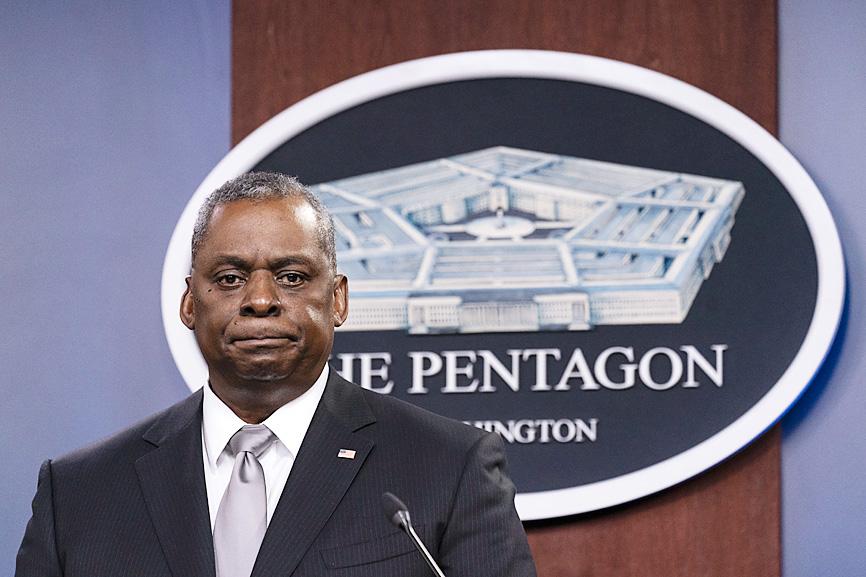The US encourages Taiwan to invest in defense and obtain asymmetric defense capabilities, US Navy Admiral Philip Davidson said on Thursday.
Davidson, commander of the US Indo-Pacific Command, made the remark in a videoconference on defense matters hosted by the American Enterprise Institute think tank.
“China is positioned to achieve overmatch” in its military capability by 2026, he said.

Photo: AP
When Beijing is able to, it would “likely choose to forcibly change” the balance of power in the Indo-Pacific region, “and I would say the change in that status quo could be permanent,” he said.
“China seeks a new world order, one with Chinese characteristics, as they often said, where Chinese national power is more important than international law,” he added.
In response to questions, Davidson said that China has stepped up activities with military aircraft and warships around Taiwan, including intrusions into Taiwan’s air defense identification zone and coast guard vessels near the Diaoyutai Islands (釣魚台).
It is crucial for the US to assist and encourage Taiwan to invest in national defense with an emphasis on obtaining defense capabilities and the means to deter an attack, in addition to arms sales and assisting Taiwan in making a strategy of deterrence a reality, he said.
Meanwhile, writing in a document entitled “Memorandum for All Department of Defense Employees,” US Secretary of Defense Lloyd Austin on Thursday named China as the “pacing challenge” to US national security.
Highlighting challenges confronting the US, Austin said that department officials and employees must deal with the “proximate” hurdles stemming from the COVID-19 pandemic and China.
Other priorities for the department were to address advanced and persistent threats posed by Russia, North Korea and Iran, and by extremist groups in the Middle East, Africa, and south and central Asia; to modernize the department; and to tackle the climate crisis.
“The department will prioritize China as our No. 1 pacing challenge and develop the right operational concepts, capabilities and plans to bolster deterrence and maintain our competitive advantage,” he said.
“We will ensure that our approach toward China is coordinated and synchronized across the enterprise to advance our priorities, integrated into domestic and foreign policy in a whole-of-government strategy, strengthened by our alliances and partnerships, and supported on a bipartisan basis in Congress,” he added.

CALL FOR SUPPORT: President William Lai called on lawmakers across party lines to ensure the livelihood of Taiwanese and that national security is protected President William Lai (賴清德) yesterday called for bipartisan support for Taiwan’s investment in self-defense capabilities at the christening and launch of two coast guard vessels at CSBC Corp, Taiwan’s (台灣國際造船) shipyard in Kaohsiung. The Taipei (台北) is the fourth and final ship of the Chiayi-class offshore patrol vessels, and the Siraya (西拉雅) is the Coast Guard Administration’s (CGA) first-ever ocean patrol vessel, the government said. The Taipei is the fourth and final ship of the Chiayi-class offshore patrol vessels with a displacement of about 4,000 tonnes, Lai said. This ship class was ordered as a result of former president Tsai Ing-wen’s (蔡英文) 2018

‘SECRETS’: While saying China would not attack during his presidency, Donald Trump declined to say how Washington would respond if Beijing were to take military action US President Donald Trump said that China would not take military action against Taiwan while he is president, as the Chinese leaders “know the consequences.” Trump made the statement during an interview on CBS’ 60 Minutes program that aired on Sunday, a few days after his meeting with Chinese President Xi Jinping (習近平) in South Korea. “He [Xi] has openly said, and his people have openly said at meetings, ‘we would never do anything while President Trump is president,’ because they know the consequences,” Trump said in the interview. However, he repeatedly declined to say exactly how Washington would respond in

WARFARE: All sectors of society should recognize, unite, and collectively resist and condemn Beijing’s cross-border suppression, MAC Minister Chiu Chui-cheng said The number of Taiwanese detained because of legal affairs by Chinese authorities has tripled this year, as Beijing intensified its intimidation and division of Taiwanese by combining lawfare and cognitive warfare, the Mainland Affairs Council (MAC) said yesterday. MAC Minister Chiu Chui-cheng (邱垂正) made the statement in response to questions by Democratic Progressive Party (DPP) Legislator Puma Shen (沈柏洋) about the government’s response to counter Chinese public opinion warfare, lawfare and psychological warfare. Shen said he is also being investigated by China for promoting “Taiwanese independence.” He was referring to a report published on Tuesday last week by China’s state-run Xinhua news agency,

‘ADDITIONAL CONDITION’: Taiwan will work with like-minded countries to protect its right to participate in next year’s meeting, the foreign ministry said The US will “continue to press China for security arrangements and protocols that safeguard all participants when attending APEC meetings in China,” a US Department of State spokesperson said yesterday, after Beijing suggested that members must adhere to its “one China principle” to participate. “The United States insists on the full and equal participation of all APEC member economies — including Taiwan — consistent with APEC’s guidelines, rules and established practice, as affirmed by China in its offer to host in 2026,” the unnamed spokesperson said in response to media queries about China putting a “one China” principle condition on Taiwan’s